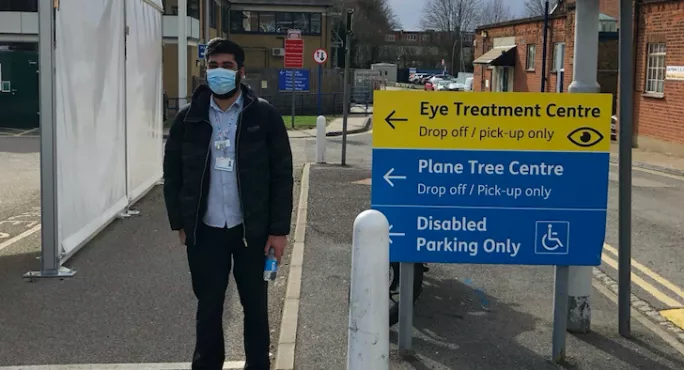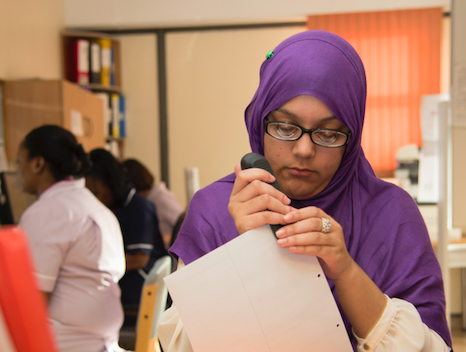Meet the SEND students working on the NHS front line

When Nouman Bhatti was asked if he wanted to return to work in February, he was anxious. Coronavirus cases had risen significantly over Christmas, England was in a third lockdown, and the future was still uncertain. And like for thousands of others, returning to work for Bhatti meant returning to the frontline of Covid: Whipps Cross NHS hospital in London.
But as concerned as he was, Bhatti was determined to go to work: not doing so, he says, would have meant giving up on full-time employment forever.
“[Covid] has made life difficult, having to sanitise my hands more than usual, wear masks all day and socially distance on the train as well. It’s much, much harder. I was nervous when I was first asked to come in, but I’m not giving up on this because it’s the only shot I’ve got,” he says.
“As long as I’m helping my team, that’s all I care about. I want to put smiles on their faces, so they can hopefully help me, too, so I can do more work. It’s more stressful as well, but that’s OK.”
News: Virtual work experience is here to stay, says expert
Tes magazine: Work placements that really work for learners with SEND
Meet Clare Cookson: ‘I won’t stop until thousands of SEND people have jobs’
Statistically speaking, Bhatti shouldn’t be working at all: he is autistic, and the likelihood of students with additional needs going on to full-time employment is low. Currently in the UK, the proportion sits at just 5.9 per cent of learners, and the figure is decreasing.
So with the chances of paid, long-term and meaningful employment slim for students with SEND, how did Bhatti secure a frontline NHS role?
He is one of 12 young people on a supported internship at Whipps Cross. The internship offers young people with SEND the opportunity to spend their days at work, rotating around a number of different departments - Bhatti was first placed as an imaging assistant in the x-ray department, and is now working at the eye treatment centre. The interns are supported by a dedicated job coach and also receive training in employability, functional maths and English skills, either at college or from teachers who visit them in their workplace.
The programme at Whipps Cross is one of just 69 across the country - and is made possible through a partnership with DFN Project Search, an organisation dedicated to transforming the lives of young people with disabilities through employment. The partnership between Whipps Cross and Project Search began in 2013 and has been hugely successful: of thel 81 interns to take part so far, around 60 to 70 per cent each year have progressed into full-time employment.
Getting SEND students into full-time employment
Claire Cookson, chief executive of DFN Project Search, says the hospital is a “shining example” of an inclusive employer that recognises the benefits diversity can bring to a workforce.
“The big thing we measure ourselves against all the time is how many people go on to secure full-time, integrated, competitive paid employment. That’s what is very special about this site: so many of the interns have actually secured employment at Whipps Cross,” she says.
“There’s one good reason for that: they are the best people for the job at the time. Whipps Cross are willing to walk the talk, and not only partner with us to provide the training opportunity, but also benefit them from this talent pool coming through.
“We’ve got interns who are patient-facing, who are in clerical roles, as well as interns doing things within facilities, in x-ray departments, in distribution, right across the careers within the hospital. [The programme] gives them the very best opportunity because they can thrive in the direction they choose.”
The return to work during Covid
But like so many other areas of education, the programme leaders and interns have had to adapt from the norm due to Covid. Initially, the cohort started in September as normal - but when Covid cases dramatically increased in December and January, provision was switched to online. Shortly after, the learners were invited to have the vaccine, and return to work.
Anxiety levels were high, says Janet Wingate-Whyte, the Project Search manager at Whipps Cross, but learners were eager to get back and help their colleagues.
“We had worked all the way through from September to December, so they had actually been here during the time of the Covid and seen it. They were really glad to be back actually. They wanted to help the hospital, they wanted to add value - they really wanted to work,” she says.
“Many of them, 10 out of 12, had the vaccine, and we also had the [Covid] lateral flow tests. We had our room designed so it was Covid-secure, and we went through wearing the masks, the social distancing, what it was going to mean for them. So when they came on to the programme they really hit the ground running, and they were so happy just to be together as a team.”
And it’s not just the interns who were initially nervous about the return to the NHS frontline, but their parents, too.
“I was worried initially, I’m not going to lie,” says Bhatti’s mother, Aisha. “I thought, ‘Oh God, how are you going to do this?’ He’s very dedicated and he has a sense of pride. He feels valued and because he feels he is an integral part of the team, he had that feeling going in. It was very serious, he was taking all these tests at the same time, but he was very responsible.
“I was apprehensive, but they did the right thing. When they found the risk was too high it stopped and he was at home. I was anxious [when he returned], but I’m so proud of him.”
The fear doesn’t go away with experience either - Iqra Sethi, who graduated from the Project Search programme in 2015, and has worked at the hospital ever since, isn’t afraid to admit that she was scared at the height of the pandemic.
“At the beginning, everyone was really worried. My family were worried I’d bring it home to them, and were obviously more worried I’d catch it. Luckily, I didn’t catch it, but I was really scared, obviously,” she says.
“At one point, I did go into ICU to see the reality and to tell people at home to just take it so seriously. I think at the beginning we didn’t all take it too seriously, but when you are in the hospital and you actually see these people, you realise it is true, and it really hit me.”

It’s a stressful time for all NHS workers, let alone those who have additional needs and therefore may need additional support. But the programme equips interns like Bhatti and Sethi with the skills they need to thrive both inside - and outside - the workplace.
Equipping SEND students with the skills to thrive
Sethi’s story, in particular, really highlights the impact that a supported internship can have on these young people’s lives. Sethi was born with severe visual impairment and, since graduating in 2015, has worked her way up to a ward clerk role. Aged 22, she’s the youngest ever clerk at the hospital, and has been integral to keeping the department running as it should during the pandemic.
Things were tough at first - she struggled, for example, to go to the local shop by herself and, with the hospital an hour away from her home, she had to quickly gain confidence in getting the train to work every day. But today, she says she keeps the doctors and nurses in check, and has become an ambassador at Moorfields Eye Hospital in supporting other young people with conditions similar to hers. In her personal life, she has got married, and now lives independently with her husband.
“I will 100 per cent say where I am today is because of Project Search. I never thought I was going to get a job, to be honest. So, coming to the project and getting a job was a lifelong dream for me and my parents and everyone in my family,” she says.
“The project has really given me confidence, and has helped me show people that I can do something. It’s shown people that yes, I have got a vision impairment, yes I have got a disability, but I can achieve other things, I can do things that other people do. It’s just maybe that I have to work around it, or do it a different way.”
‘Ability rather than disability’
And for Whipps Cross, the benefit of Project Search goes way beyond the impact on the interns themselves - it provides the hospital with a much-needed pipeline of talent, says chief executive Alan Gurney.
“I would encourage any hospital chief executive to look at this opportunity. The NHS is the biggest employer in the country and most hospitals tend to be the biggest employer in the town they are based in. And actually, we will always have workforce requirements and we are growing, and we should always be looking at where our future pipeline of staff are coming from,” he says. “We look at ability rather than disability. In my experience of the many, many interns I’ve seen and have got to know personally, they all have a very unique contribution to make in the running of our hospital.”
When the pandemic hit, there was no question of whether or not the programme would continue, he says.
“As you can imagine, when the pandemic first hit this time last year, I didn’t recognise my own hospital. We were literally transforming overnight. We had to rapidly expand our critical care functions and everything else. The whole hospital has been transformed,” he says.
“Project Search is part of our fabric, and, to me, it was so important it continued as we have everything else through the pandemic. I was delighted when in August, following comprehensive risk assessments, we were able to reinstate the programme, and I think we are one of very few who has gone back in full pelt with a full cohort of interns.”
And for Bhatti, the skills of resilience, bravery and commitment that he’s fostered while working throughout the pandemic have given him confidence about his future.
“I have no doubt [of working in the hospital long-term]. I’m sure if I can go this way and not give up, I hope to see me working for five years here and hopefully until I die, I guess,” he laughs.
“The thing I think about [for my future] is getting a job, finally doing something I can do, like an adult can do for the family and also help out with my little sibling, who’s 7, with school. That’s all I can think of. Oh, and if I was to get a family, I’d probably want that as well.”
You need a Tes subscription to read this article
Subscribe now to read this article and get other subscriber-only content:
- Unlimited access to all Tes magazine content
- Exclusive subscriber-only stories
- Award-winning email newsletters
Already a subscriber? Log in
You need a subscription to read this article
Subscribe now to read this article and get other subscriber-only content, including:
- Unlimited access to all Tes magazine content
- Exclusive subscriber-only stories
- Award-winning email newsletters